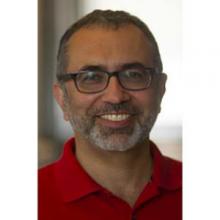Contemporary Artificial Intelligence (AI) systems, like ChatGPT, are powered by artificial neural networks (ANNs). Originally coined "neural" because they were inspired by the human brain, these ANNs are founded on the century-old understanding of brain function. As brain research has progressed, it's become evident that ANNs bear only a superficial resemblance to their biological counterparts. This presents an intriguing avenue: can we design AI that's more akin to our brains, leading to more intelligent, energy-efficient, and resilient systems? My team is venturing down this path, aiming to reverse-engineer the algorithmic principles of biological networks. Our multifaceted approach encompasses mapping the brain's structure, monitoring its function, and constructing a Physics-like theoretical framework. Not only does this endeavor hold the promise of transforming AI, but it could also unlock invaluable insights into treating various brain disorders.
 |
Click above to play Can Neuroscience Help Advance Artificial Intelligence? or watch at http://online.kitp.ucsb.edu/online/friends/chklovskii/

